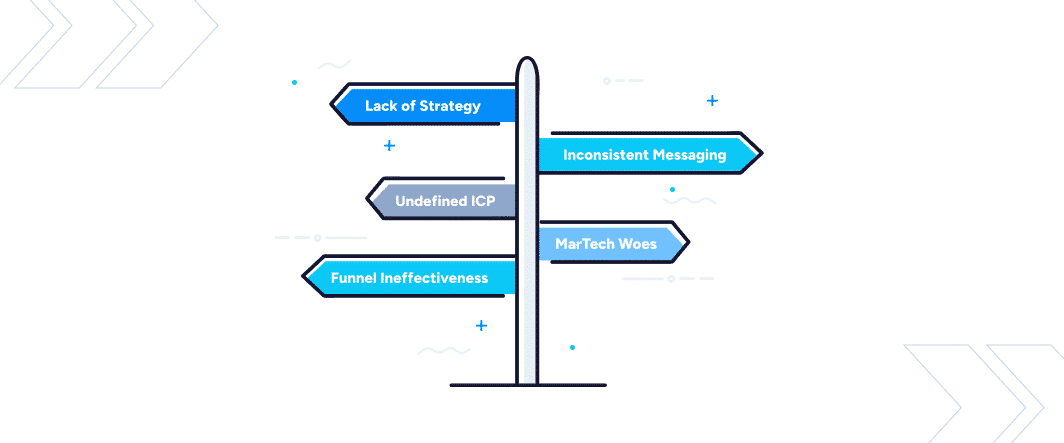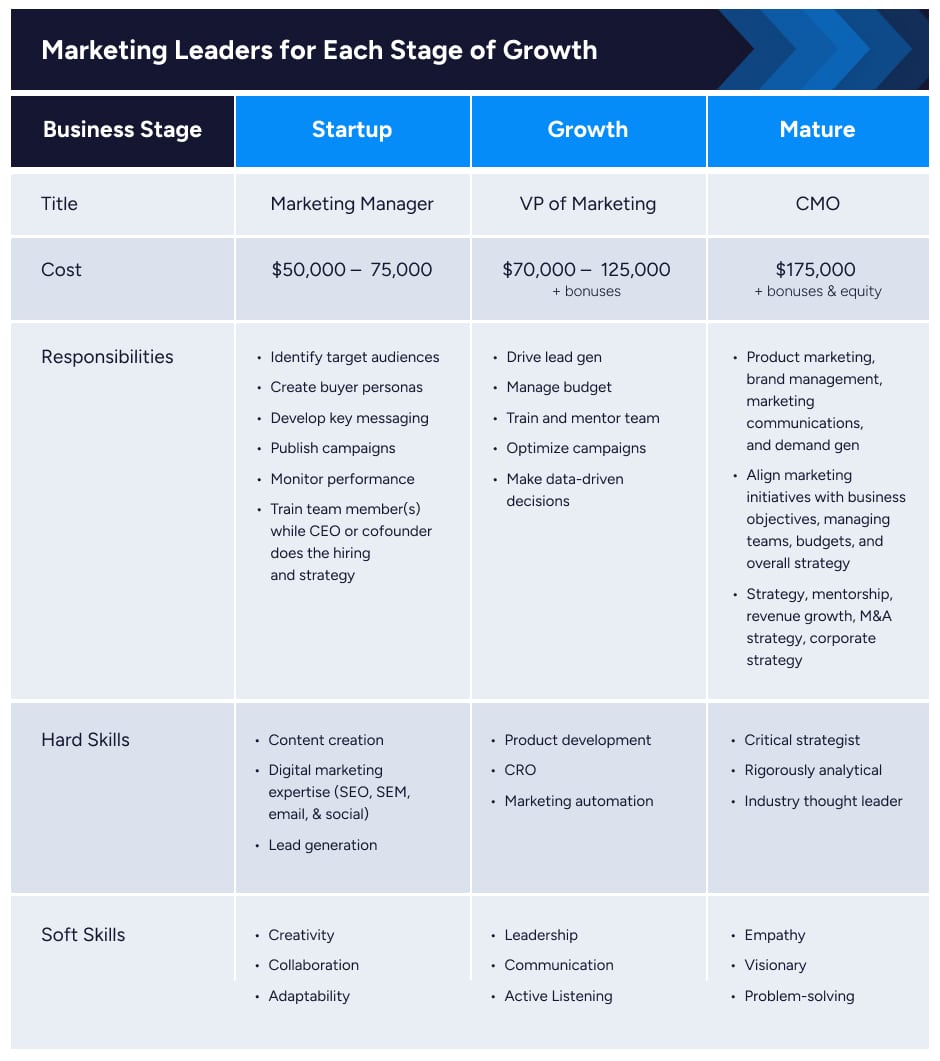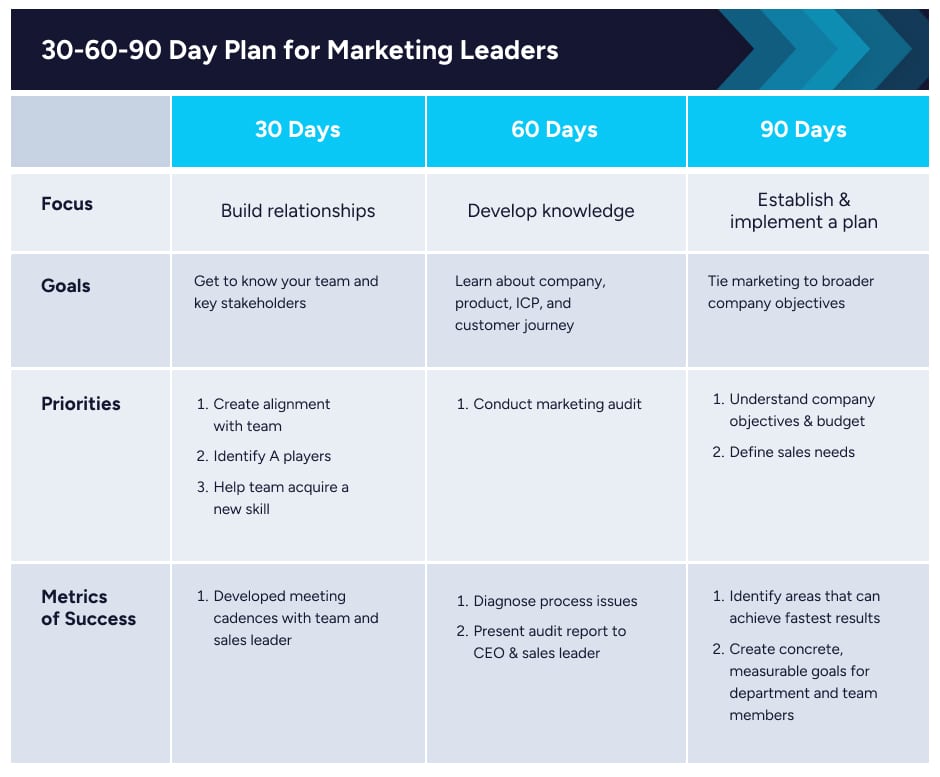Should SaaS Leaders Run Marketing, Hire a Manager, or Invest in a CMO?

If you’re like most founders, you wore a lot of different hats when you started your company—and maybe you still do. When you’re getting your business off the ground, juggling multiple roles is a smart, often essential way to save money.
But as your company starts to scale, trying to do it all is a recipe for lower productivity, chaotic workflow, and stunted growth. If you haven’t begun delegating, it may be time to start, and one of the most important roles to consider hiring is marketing leader.
We’ve worked with hundreds of SaaS companies at SEG, both those that had no marketing strategy at all and those with a marketing leader, team, and built-out plan. Almost always, the SaaS businesses with a defined leader in this role and team have had stronger metrics.
It’s no wonder because growth and marketing are inextricably linked. A marketing leader blends creativity with hard data to generate interest among users, communicate what sets your product apart, and understand what’s working and what isn’t, all while staying aligned with your company’s overall strategy. The result is a stronger brand, more revenue, and growth.
If growth isn’t a priority for you, no need to read on (you’re probably too busy juggling all those hats anyway). But if growth is a priority, it’s time to think seriously about hiring someone to fill this gap in your scaling strategy.
What Are the Responsibilities of a Marketing Leader?
Let’s start with what a marketing leader actually does.
Your marketing leader will play a critical role in driving growth and building your company’s brand awareness by overseeing your company’s marketing strategy, tactics, and execution. While the day-to-day tasks will vary depending on your stage of growth and other factors, standard responsibilities of a marketing leader include:
- Developing a comprehensive marketing strategy that aligns with your company’s goals and objectives
- Conducting market research to identify target audiences, customer needs, and industry trends to better inform marketing strategies and tactics
- Building brand awareness and creating a strong brand identity across different channels and platforms
- Creating and executing marketing campaigns designed to generate leads, drive sales, and engage customers, using tactics such as advertising, email marketing, social media, content marketing, and more
- Hiring and mentoring a strong team with the skills needed to achieve your goals
- Collaborating with other teams across the company, including sales, product development, and customer support, to ensure that marketing strategies and tactics are coordinated with overall company goals and objectives
- Managing marketing budgets to ensure that resources are allocated effectively to support marketing initiatives
- Analyzing and reporting on the marketing performance of marketing campaigns and initiatives, using metrics such as conversion rates, customer engagement, and return on investment (ROI)

5 Signs That It’s Time for a Marketing Leader
When you’re in true start-up mode, you may simply not have the budget for a marketing leader. It’s inevitable, though, that as you grow, you’ll eventually have to hire a dedicated staff member who can focus on creating effective marketing strategies that drive growth, engage customers, and build brand awareness.
To figure out if now is the time, start by asking yourself:
Do I have time to build marketing campaigns myself?
Are we able to scale effectively?
Are we improving brand awareness?
If the answer to any of these questions is no, it’s probably time to look for a marketing leader.
Other signs that it’s time to hire someone include:
Lack of a clear marketing strategy
If your company does not have a clear marketing plan in place, it will benefit from hiring a marketing leader to develop and execute a comprehensive strategy.
Inconsistent messaging and branding
If your company’s messaging and branding are inconsistent across different channels or platforms, it may be time for a marketing leader who can develop and enforce a consistent brand identity and messaging strategy.
Inadequate lead generation and sales
If you are struggling to generate leads and drive sales, you are probably ready for a marketing leader who can develop and execute effective lead generation and sales strategies, including targeted advertising, content marketing, and other tactics.
Lack of market awareness and customer insights
If you’re unclear about who your target market is and what your customers’ needs and preferences are, a marketing leader can conduct market research and develop customer personas to inform your marketing strategies and tactics.
Inability to keep up with industry trends
If you are struggling to keep up with industry trends and emerging technologies, you may be ready for a marketing leader who can stay up to date on the latest trends and technologies and incorporate them into your company’s marketing strategy and tactics.
Fractional CMO or Full-time Marketing Leader?
While both provide valuable marketing leadership and expertise, not every company needs a full-time marketing leader right away. Depending on your company’s needs and resources, a fractional CMO may be an equally good and less expensive alternative.
Here are some things to consider when deciding between a full-time marketing leader and a fractional CMO:
Company Size
If your company is just starting out and still relatively small, you may not need a full-time marketing leader yet. A fractional CMO can provide strategic guidance and leadership on a part-time or project basis while allowing you to maintain flexibility and control over your budget.
Complexity of Marketing Needs
If your company has complex marketing needs, such as multiple product lines or a highly competitive market, a full-time marketing leader who can provide ongoing support and guidance to your marketing team may be the better option.
Budget
Hiring a full-time marketing leader can be expensive, especially if you are a small or mid-sized company. A fractional CMO is a more cost-effective option that allows you to access high-level marketing expertise on a more affordable basis.
Type of Expertise Needed
Fractional CMOs often have extensive marketing experience across a range of industries and companies, which can be beneficial for companies that need a broad scope of marketing skills and expertise.
8 Things Marketing Leaders Should Do in Their First 90 Days
Whether manager or CMO, full-time or fractional, your marketing leader’s first 90 days are crucial for setting them—and by extension, your company—up for success. You and your marketing leader should work together to create clear milestones and chart a course of action for their first three months on the job.
During this time, your marketing leader should develop a deep understanding of your company’s mission, values, and goals; assess the current marketing strategy and team; and create a comprehensive marketing plan that aligns with the company’s strategic objectives. They should also use this time to establish credibility and build relationships, laying the foundation for a successful marketing strategy that drives growth and engages customers.
The exact milestones you choose to focus on will depend on your situation, but here are some common ones that you and your marketing leader may aim to achieve during this time:
Understand the company’s mission, values, and goals
By the end of their first three months, your CMO should have a deep understanding of your company’s mission, values, and goals to ensure that your marketing strategy supports the broader company strategy.
Build relationships with key stakeholders
Your marketing leader should prioritize building relationships with other leaders within the company, as well as with external partners and vendors, to build trust and establish a shared understanding of marketing priorities and goals.
Conduct a thorough marketing audit
One of the first steps for your marketing leader is to understand the strengths and weaknesses of your current marketing plan. They should conduct a comprehensive audit of your existing marketing strategies, tactics, and performance in order to develop a roadmap for improvement.
Conduct a thorough analysis of the market and competition
In addition to understanding your company’s strengths and weaknesses, your marketing leader should also conduct a thorough analysis of the market and your competition to identify key trends, gaps, and opportunities for your company’s product or service.
Define a clear marketing plan & budget
Armed with an assessment of your company’s current marketing strategies and an understanding of the competition, your marketing leader should develop a comprehensive marketing plan and budget that outlines key initiatives, timelines, and resource requirements to achieve the company’s goals.
Build a high-performing marketing team
A marketing leader should prioritize building a strong and cohesive marketing team that will help them achieve their plan. They should begin by evaluating your current team’s skills and capabilities to identify gaps and opportunities for improvement and to determine whether any new hires or training programs are needed. From there, they should focus on hiring top talent, if needed, and setting clear expectations.
Establish clear goals and KPIs for the marketing team
To measure progress and demonstrate the value of marketing initiatives to the broader organization, the leader should establish clear and measurable performance metrics and goals for their team.
Communicate the marketing strategy and plan to the broader organization
With a new marketing strategy in place, your marketing leader should communicate it clearly to the broader organization to ensure that everyone is aligned and working towards the same goals.
Your 90-Day Plan For Your New Marketing Leader
As CEO or founder of your business, it’s important to work closely with your marketing leader. You should help them understand your company’s objectives and strategy and work with them to create a 90-day plan that supports your goals.
Following is an example of a 90-day plan for this role. Feel free to use it as a template as you and your marketing leader work through your own 90-day plan.











